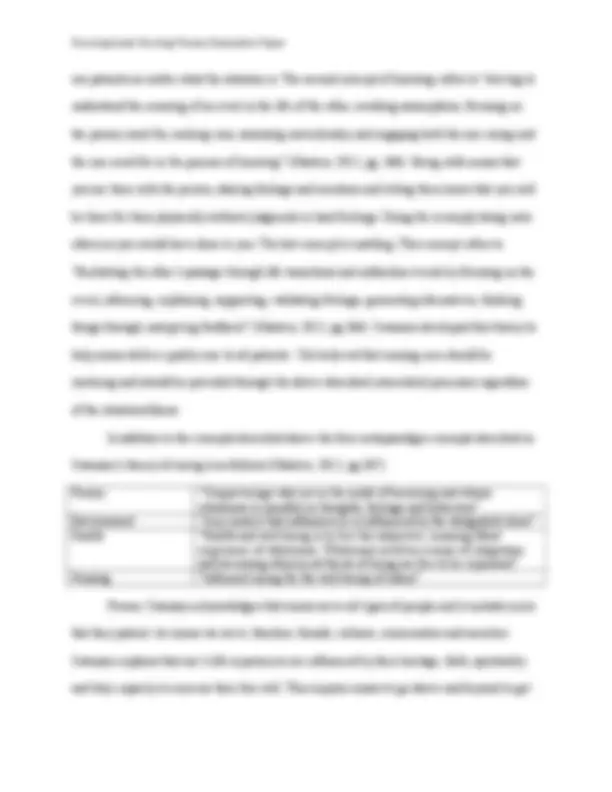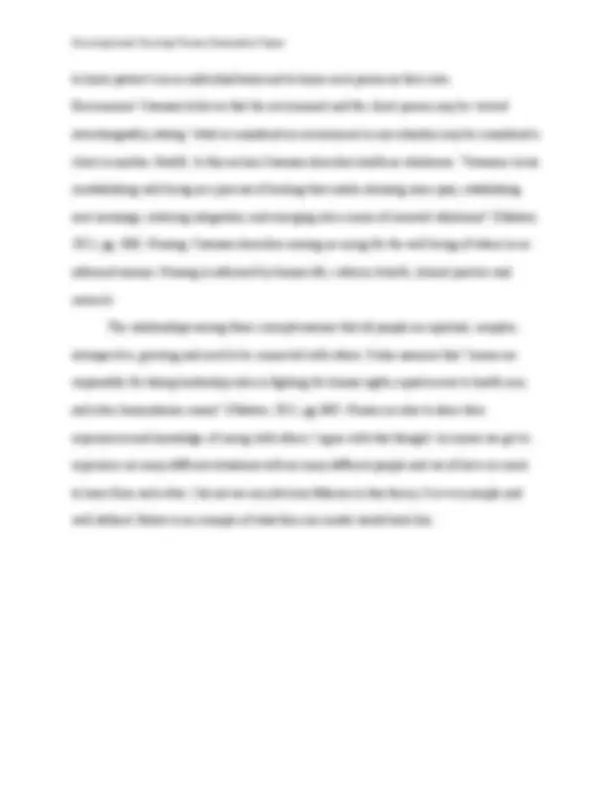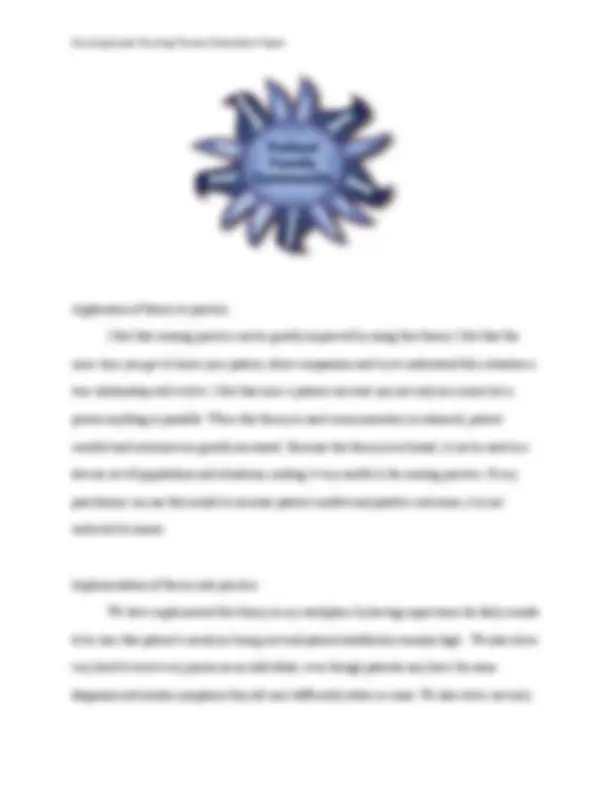





Study with the several resources on Docsity

Earn points by helping other students or get them with a premium plan


Prepare for your exams
Study with the several resources on Docsity

Earn points to download
Earn points by helping other students or get them with a premium plan
Community
Ask the community for help and clear up your study doubts
Discover the best universities in your country according to Docsity users
Free resources
Download our free guides on studying techniques, anxiety management strategies, and thesis advice from Docsity tutors
Explain in about kristen swanson's and describes health, enviornment , person and nursing and patient family community.
Typology: Study notes
1 / 7

This page cannot be seen from the preview
Don't miss anything!




Nursing Theory Evaluation Paper Theory of Caring: Kristen M. Swanson Concordia University, Nebraska RN to BSN Nursing Program For partial fulfillment of the requirements of NUR Professional Roles, Ethical Issues and Nursing Theories Nicole Rea RNBC March 23, 2013
Kristen Swanson earned her Baccalaureate degree in nursing from the University of Rhode Island in 1975, in 1978 she graduated with her master’s degree in adult health and illness nursing from Pennsylvania and finally she graduated with her PhD in psychosocial nursing from the University of Colorado. As part of her doctorate study she participated in a cesarean birth support group. It was here that she discovered that women really needed to talk about their own experiences and pregnancy loss, so this became the topic of her dissertation and her program of research. Her dissertation, The Unborn One: A profile of the Human Experience of Miscarriage was developed to review and describe the human experience and the caring needs of those who experience a miscarriage. For this dissertation she set out to conduct a descriptive investigation of 20 women all of whom had recently had a miscarriage and to identify the behaviors of caring that they felt were most helpful in their recovery. And from this study Swanson developed her middle range theory of caring. Purpose of theory: The purpose of her theory was to define caring and to define what it means to practice nursing in a caring manner. Swanson defines caring as a “nurturing way of relating to a valued other toward whom one feels a personal sense of commitment and responsibility” (Masters, 2012, pg.365). Within her caring theory Swanson describes five basic but very vital processes for caring: maintain belief, knowing, being with, doing for, and enabling. Swanson developed these processes to help nurses understand, communicate and be one with the patient. Theory concepts: The concept of maintaining belief is simply “sustaining faith in the other’s capacity to get through an event or transition and face a future with meaning.” (Masters, 2012 , pg.365). This means that as nurses we need to provide hope, faith and build self-esteem to help empower
to know patient’s on an individual basis and to honor each person as their own. Environment: Swanson believes that the environment and the client-person may be viewed interchangeably, stating “what is considered an environment in one situation may be considered a client in another. Health: In this section Swanson describes health as wholeness. “Swanson views reestablishing well-being as a process of healing that entails releasing inner pain, establishing new meanings, restoring integration, and emerging into a sense of renewed wholeness” (Masters, 2012, pg. 368). Nursing: Swanson describes nursing as caring for the well-being of others in an informed manner. Nursing is informed by human life, cultures, beliefs, clinical practice and research. The relationships among these concepts assume that all people are spiritual, complex, introspective, growing and need to be connected with others. It also assumes that “nurses are responsible for taking leadership roles in fighting for human rights, equal access to health care, and other humanitarian causes” (Masters, 2012, pg.369). Nurses are also to share their experiences and knowledge of caring with others. I agree with this thought. As nurses we get to experience so many different situations with so many different people and we all have so much to learn from each other. I do not see any obvious fallacies in this theory. It is very simple and well defined. Below is an example of what this care model would look like.
Application of theory to practice: I feel that nursing practice can be greatly improved by using this theory. I feel that the more time you get to know your patient, show compassion and try to understand their situation a true relationship will evolve. I feel that once a patient can trust you not only as a nurse but a person anything is possible. When this theory is used communication is enhanced, patient comfort and outcomes are greatly increased. Because this theory is so broad, it can be used in a diverse set of populations and situations, making it very useful in the nursing practice. Every practitioner can use this model to increase patient comfort and positive outcomes; it is not restricted to nurses.
Implementation of theory into practice: We have implemented this theory in my workplace by having supervisors do daily rounds to be sure that patient’s needs are being met and patient satisfaction remains high. We also strive very hard to treat every person as an individual, even though patients may have the same diagnosis and similar symptoms they all react differently when in crisis. We also strive not only
that the participants would say that they had lost a baby. All study participants (treat or not) assigned less personal significance to miscarrying and had higher levels of self-esteem and less anxiety, anger and confusion” (Peterson and Bredow, 2009, pg. 196). The study found that while time helped woman heal, caring behaviors helped increase their self-esteem and decrease symptoms of depression. Conclusion Caring is a fundamental part of nursing that has been around for many years. Nursing as a whole strives to improve patient comfort on a daily basis and will continue to grow as a profession and organization to be the best. I feel that in every stage of nursing education there is some part of education based on caring and as we continue to advance our technologies and practices the education will also change and evolve.
References: Masters, K. (2012). Nursing Theories: A framework for Professional Practice. (pp. 365-369) Sudbury, MA: Jones and Bartlett Learning, LLC. Peterson, S. and Bredow, T. (2009) Middle Range Theories: Application to Nursing Research. (2nd^ Ed. pp. 196). Philadelphia, PA: Wolters Klower Health/Lippincott Willimams & Wilkins